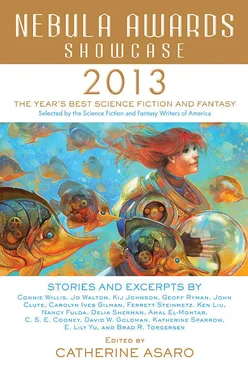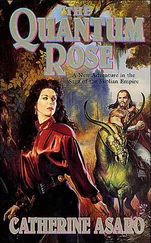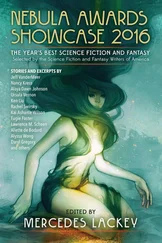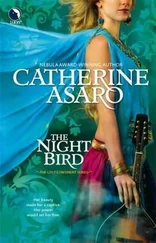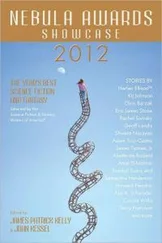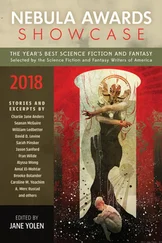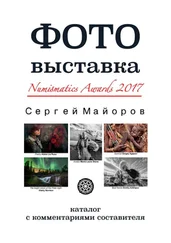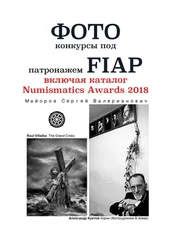Sophie frowned. “Do you mean the old man, or the Creature?”
“What creature is that, sugar?”
“The one that brought me here. I have to find it, so I can go back home.”
Africa smoothed her hair gently. “This your home now, sugar, less Mr. Robert change his mind. You rest.”
* * *
Next time Sophie woke, Dr. Charles was taking her pulse.
“Strong and regular,” he said. “Mrs. Fairchild will be pleased. A couple of days of rest, and you’ll be as good as new.”
Dr. Charles gave her hand a pat and moved away. Sophie found her glasses under the pillow and put them on. The room snapped into focus. Sophie looked around at four iron beds draped in gauze, and a cabinet full of jars and bottles beside a table where Dr. Charles sat unrolling a long strip of linen around a slave woman’s arm. A second slave, an older woman in a big white apron, stood beside him with a jar.
Dr. Charles snipped off the bandage, tied the ends, and tucked them in neatly. “There, Rhodes. I don’t want you back in the fields for another few days yet. I’ll tell Mr. Akins to assign you something light.”
The woman Rhodes thanked him and left. The older woman, whose name was Aunt Cissie, fetched in skinny man with a hacking cough, followed by a big man complaining of a griping in his guts, an old woman bent over with rheumatism, and three or four more. Sophie watched Dr. Charles examine them, peering into mouths and eyes, sounding chests, instructing Aunt Cissie to give them liniment or spoons-full of foul-smelling liquid, asking after the health of a brother, an aunt, a father, a wife, listening to the soft-voiced, respectful answers. When the last patient had left, he dismissed Aunt Cissie, pulled out a long black book, and started to write in it.
The pen scratched softly, the flies buzzed lazily against the ceiling. Sophie was on the edge of drifting off to sleep again when a clattering on the porch jerked her awake. The door flew open and a man stomped in. He was dirty and roughly dressed, and Sophie thought he was another field hand until she saw that he kept his broad-brimmed hat on his greasy curls and looked Dr. Charles straight in the eye.
“Devon Cut needs a new gang-driver,” he said.
Dr. Charles kept on writing. “Give it to Old Guam.”
“Guam? That pipe-sucker?” His voice was like a street car braking. “He ain’t done an honest day’s work since the day his mammy weaned him.”
“Mrs. Fairchild has chosen Old Guam, and I agree.” Dr. Charles laid down his pen. “By the way, Akins, I’ve had a letter from Chicago. The new evaporators are on their way to New Orleans and should be here, God willing, in a few weeks. Have you read those articles I gave you?”
Akins tipped his hat to the back of his head. “Yessir,” he said. “That there evaporator’s a fine machine, but I’m thinking it’s a mite complicated for them niggers to run.”
“Given that a black man invented the apparatus, I have no doubt black men can learn to operate it, given the proper training.” Dr. Charles got up and put on a black frock coat. “Come along to the Big House, and we’ll discuss it. Why, hello, Canada. Have you come to visit Sophie?”
Sophie saw Canada, looking very small and black and meek, standing in the door with a large covered basket on her arm. “Yessir.” Her voice was so low Sophie could hardly hear her. “I brung her some broth.”
Dr. Charles patted the little girl’s head as he left. Atkins ignored her completely. As soon as they were out the door, Canada turned and stuck out her tongue.
“Who’s that horrible man?” Sophie asked.
“That old Mist’ Akins, the overseer. His Mama beat him with an ugly stick so hard, it gone straight on till his soul.”
Sophie laughed. “You’re funny, Canada.”
“White folks calls me Canada.” She pulled a canister from the basket. “You call me Canny.”
Sophie pulled herself up against the thin pillow. There was so much she didn’t know about living in the past. If she was going to be stuck here for a while, she’d better learn—preferably before she saw Mammy again. “Canny, will you tell me about Oak River?”
“Sure. What you want to know?”
“Everything, I guess. I never lived on a plantation before.”
Canny giggled. “You surely ain’t. Flandy like to bust himself laughing when he hear ’bout you asking for a bath-room!”
Sophie flushed. “I know I’ve got a lot to learn.”
“What you want to know?”
“Well, how soap is made and what a gang-driver does and why there’s a curtain over the bed, to start off with.”
Canny nodded. “Well, a gang-driver, he watch the field hands so they don’t slack off. The mosquito bar keep the mosquitoes from eating you all alive in the night. I don’t know nothing ’bout soap-making ’cept it stink to Heaven, but I know lots ’bout doves. I takes care of all the doves in the pigeon house.”
“Tell me about the doves, then,” Sophie said. “But I also need to know about cooking and washing and ironing and—”
“Ain’t nobody know all that,” Canny said. “And if’n they did, they too busy to hang round here telling you about it.” She thought a moment. “Tell you what. Tomorrow’s Saturday. Everybody gots a plenty of chores, but I asks around some, see who can maybe come by for a spell. That suit you?”
“That suits me just fine,” Sophie said. “Thank you.”
Canny unscrewed the canister and poured a fragrant golden stream into a tin cup. “Momi say if this set well, she see bout trying you on boil chicken and white bread. You gots to drink, too—water, milk, sassafras tea.”
“Your Mama sure knows a lot about sick people.”
“Momi know everything there is about everything,” said Canny. “Momi a two-headed woman.”
“Huh?”
“A two-headed woman. Sometimes, when she bring the babies and tend to folks and make gris-gris , she not just herself, but the other one, too.”
“The other one?” Sophie remembered the velvety face in her dream. “You mean Yemaya?”
“Shush—that name a special secret. Maybe Momi tell you about it by and by.” She made a face. “Maybe she tell me, too. Now drink up you soup, and tell you a story. You ever heard how come snakes got poison in they mouth and nothing else ain’t got it?”
“No,” said Sophie.
“Don’t they tell no stories in New Orleans?”
“They tell lots of stories. Just not that one.”
Canny settled down cross-legged at the foot of the bed. “When God make the snake, he put him in the bushes to ornament the ground. But things didn’t suit the snake, so one day he get on a ladder and go up to see God.”
Sophie finished the fragrant chicken broth, took off her glasses, and listened sleepily as the snake complained to God about getting stomped on and God gave him poison to protect himself. Canny described how, when the snake got a little carried away with his gift, the other animals climbed the heavenly ladder to complain in their turn. Sophie’s eyes grew heavier and heavier. About the time God was coming up with an answer to their complaints, she fell asleep.
THE SEA KING’S SECOND BRIDE
poetry
C. S. E. Cooney
2011 Rhysling Winner, Long Poem Category
March is blowing wet and snowy when I stumble on the Sea King
He has washed up from the water—all his nakedness like heaven
With his hair so lank and heavy, green and black as
Sodden seaweed, with his harp of kelp and pearl
Cracked to pieces on his knee
“What ails you, my Sea King?” I ask this creature, laughing
I love him—how I love him, immediate and sudden
The way you love a rainstorm, the Milky Way, a leopard
That reckless love of wild things after years pent in a city
Читать дальше
